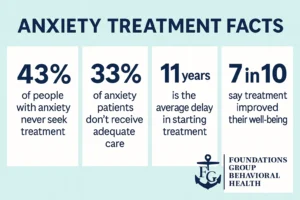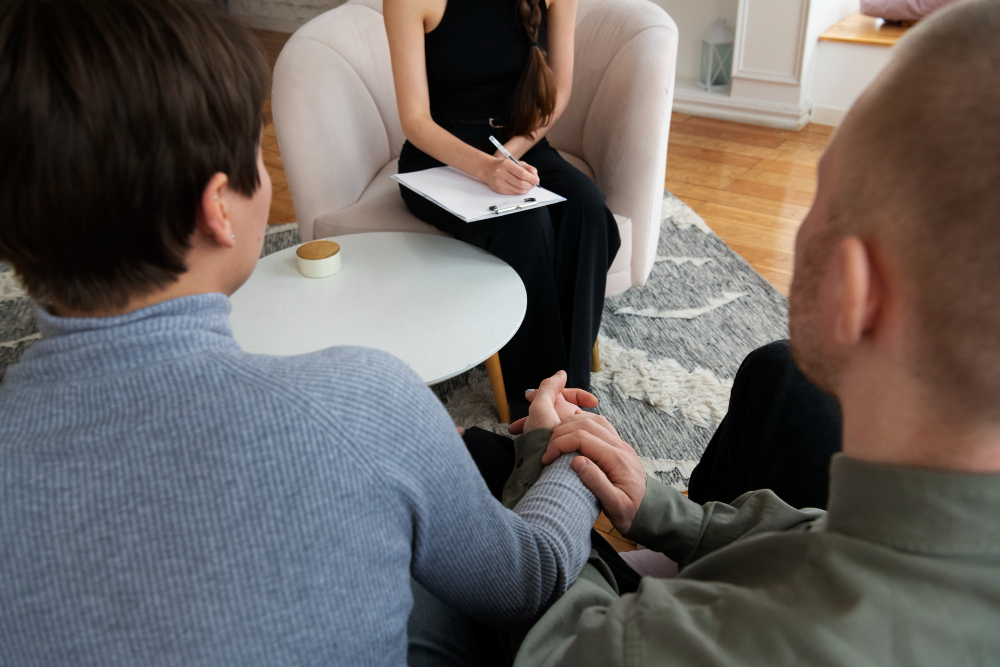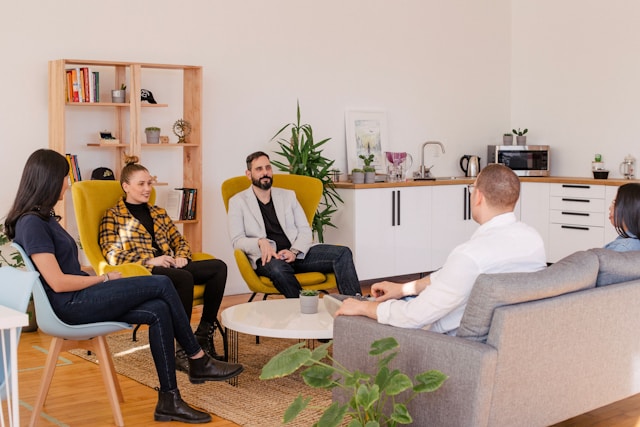For a long time, I didn’t think treatment worked.
Not because I hadn’t tried. I had. Therapy. Meds. Mindfulness apps. I did the things. Some of them helped for a minute—but nothing ever stuck. I’d feel better for a few weeks, maybe a month, and then it would all come crashing back. Same anxiety. Same spirals. Same shutdown.
So when someone brought up an anxiety treatment program last fall, I had one reaction: nope.
But that was before Thanksgiving. Before I finally understood what a real anxiety program could look like—and how it would change everything.
I Thought I Could Handle It. I Was Wrong.
I’ve always had anxiety, but I got good at hiding it.
I could show up to work, hit deadlines, smile at neighbors. But inside? Constant hum. Racing thoughts. What-if loops. And when it came to family gatherings—especially holidays? It all boiled over.
Thanksgiving was the worst. My family is… a lot. There’s love, sure. But there’s also loud opinions, unspoken resentments, way-too-personal questions, and tension so thick it could chew back.
Every year, I’d show up with the same strategy:
- Smile and nod
- Don’t react
- Escape to the bathroom when needed
And every year, I’d leave feeling like I got run over by an emotional truck. Sweaty, shaky, raw. It was like I’d been holding my breath for hours.
Last year, after yet another post-Thanksgiving spiral, I realized: This isn’t just stress. This is survival mode. And I’m exhausted.
Giving Treatment One More Shot (With Eyes Wide Open)
I didn’t suddenly believe treatment would fix me. I wasn’t looking for a miracle. I just knew I couldn’t keep living like this.
That’s when a friend mentioned Foundations Group’s anxiety treatment program in Massachusetts. She said it helped her in a way traditional therapy hadn’t.
“Don’t expect magic,” she said. “But expect real tools. And expect to feel seen.”
Honestly? That last part got me.
I called. Booked an intake. Still skeptical. But also… quietly hoping.
What I Found Inside a Real Anxiety Treatment Program
This wasn’t the kind of therapy where you vent and leave with a new breathing technique.
It was structured and comprehensive. We worked on:
- Understanding the root of my anxiety
- How my nervous system responds to threats (real and perceived)
- Cognitive distortions and pattern rewiring
- Grounding tools that weren’t just buzzwords
I met people who weren’t “broken”—just overwhelmed like me. I didn’t have to perform wellness. I didn’t have to pretend I was okay.
I started to learn how to pause before the spiral. How to check my reality instead of assuming the worst. How to recognize that anxiety isn’t weakness—it’s a signal. One I could learn to respond to instead of obey.
Then Came the Real Test: Thanksgiving
The timing was brutal.
I was barely two months into treatment when the invite came: family Thanksgiving, same house, same chaos.
In the past, I would’ve declined and made up an excuse—then spent the whole day in bed, numb and ashamed.
But this time, I went.
And while the dynamics hadn’t changed—my uncle still ranted about politics, my mom still asked if I was “ever going to settle down”—I had changed.
Here’s what was different:
- I had a plan. My therapist and I had mapped out exactly what to expect and how I could respond.
- I had tools. Breathwork that actually worked. A grounding object in my pocket. A practiced response to passive-aggressive comments.
- I had boundaries. I didn’t have to stay the whole time. I didn’t have to answer every question. I could step outside when I needed air—without explaining myself.
For the first time in years, I left a family holiday without feeling like I’d imploded.
I Didn’t “Cure” My Anxiety—But I Changed My Relationship With It
That’s something I wish more people understood:
Anxiety treatment isn’t about erasing anxiety—it’s about learning to live alongside it, instead of underneath it.
What Foundations helped me do was depersonalize the anxiety.
Instead of: “Why am I like this?”
I started asking: “What is this reaction trying to protect me from?”
That shift changed everything.
I’m not magically calm now. I still get triggered. But I’m not ashamed of it anymore. I can recognize it, name it, and choose how to respond. That’s freedom.
If You Think Treatment Didn’t Work—Maybe You Weren’t Given the Right Kind
If you’ve done therapy before and left feeling like it barely scratched the surface—you’re not alone.
A lot of us never got the kind of targeted, skills-based support that anxiety actually needs.
We were told to “calm down” instead of being taught how to regulate.
We were asked to talk about our feelings, but not shown what to do with them.
The anxiety treatment program I found in Cape Cod, MA changed that for me. It made me feel capable again—not fixed, but equipped.
Local Access Makes a Difference
If you’re near Barnstable County or Falmouth, MA, you’re not far from this kind of support. Local care means you can get help without uprooting your life. It means support that’s accessible, consistent, and grounded in your actual community.
FAQs About Anxiety Treatment Programs
How is an anxiety treatment program different from regular therapy?
An anxiety treatment program is usually more structured than traditional talk therapy. It combines evidence-based practices like CBT, exposure therapy, psychoeducation, and skills training. It’s often run in a group format with individual support built in.
Do I have to be diagnosed with an anxiety disorder to qualify?
No. If anxiety significantly interferes with your daily life—whether or not you have a formal diagnosis—you may benefit. Foundations offers assessments to help you figure out if the program fits.
What if I’ve tried therapy or meds before and they didn’t help?
That’s more common than you think. This program is designed for people who haven’t found relief through standard outpatient therapy. The difference is in the intensity, structure, and integration of tools you can actually use.
How long does the program last?
Length varies by need. Some people do short-term programs (6���12 weeks); others stay longer for deeper work. Foundations Group will tailor a plan that makes sense for you.
Can I do this while working or going to school?
Yes. Most anxiety programs at Foundations are designed with real life in mind. Flexible schedules and evening groups make it possible to get care while keeping your routine.
Is it covered by insurance?
Foundations works with most major insurance providers. Their admissions team can walk you through what’s covered and what your options are.
You’re Not a Lost Cause
If you’ve been telling yourself:
“Nothing works for me.”
“I’ve already tried.”
“I’m too much.”
“I should be able to handle this.”
Please hear me: You’re not broken. You’re just tired. And there’s support that actually helps.
If the idea of surviving the next holiday season makes your chest tighten, consider reaching out now. Don’t wait for another breakdown to justify taking care of yourself.
Ready to try something different?
Call 888-685-9730 or visit Foundations’ Anxiety Treatment Program in Massachusetts. Whether you’re in Barnstable County or Falmouth, support is closer than you think—and different than you remember.









